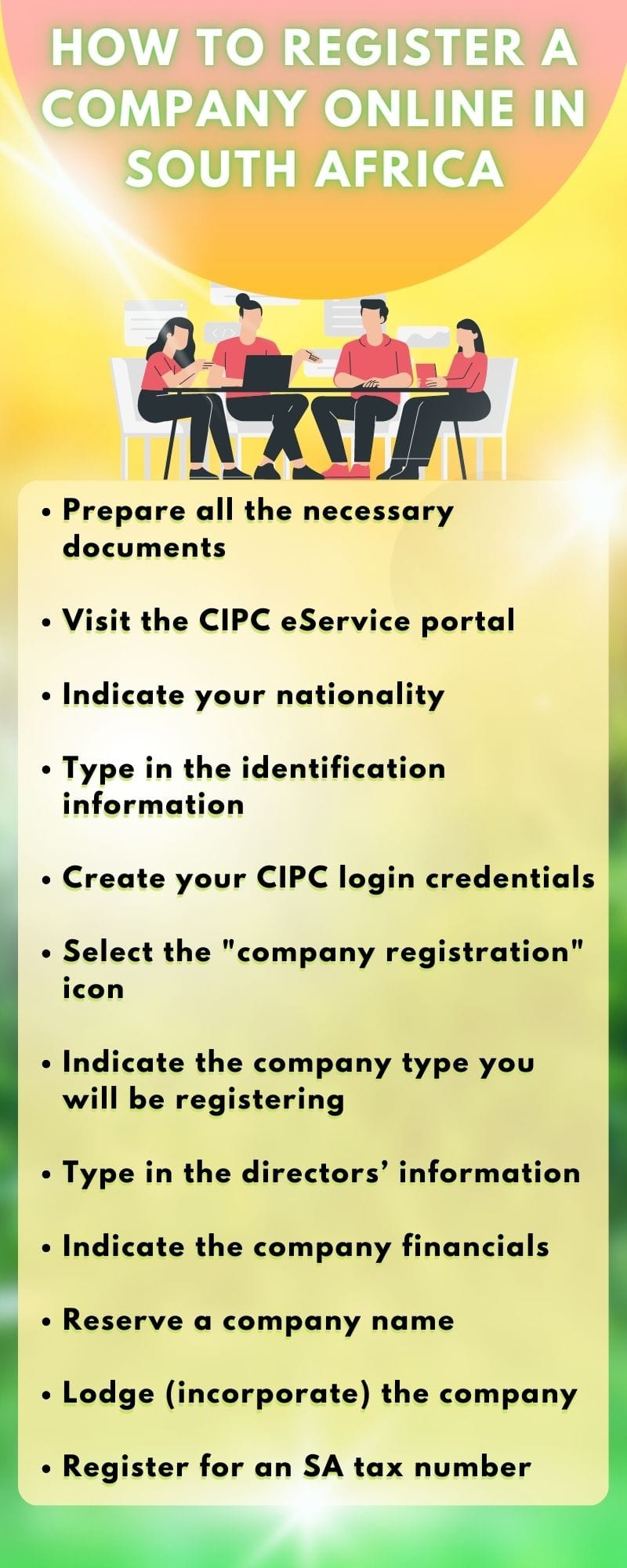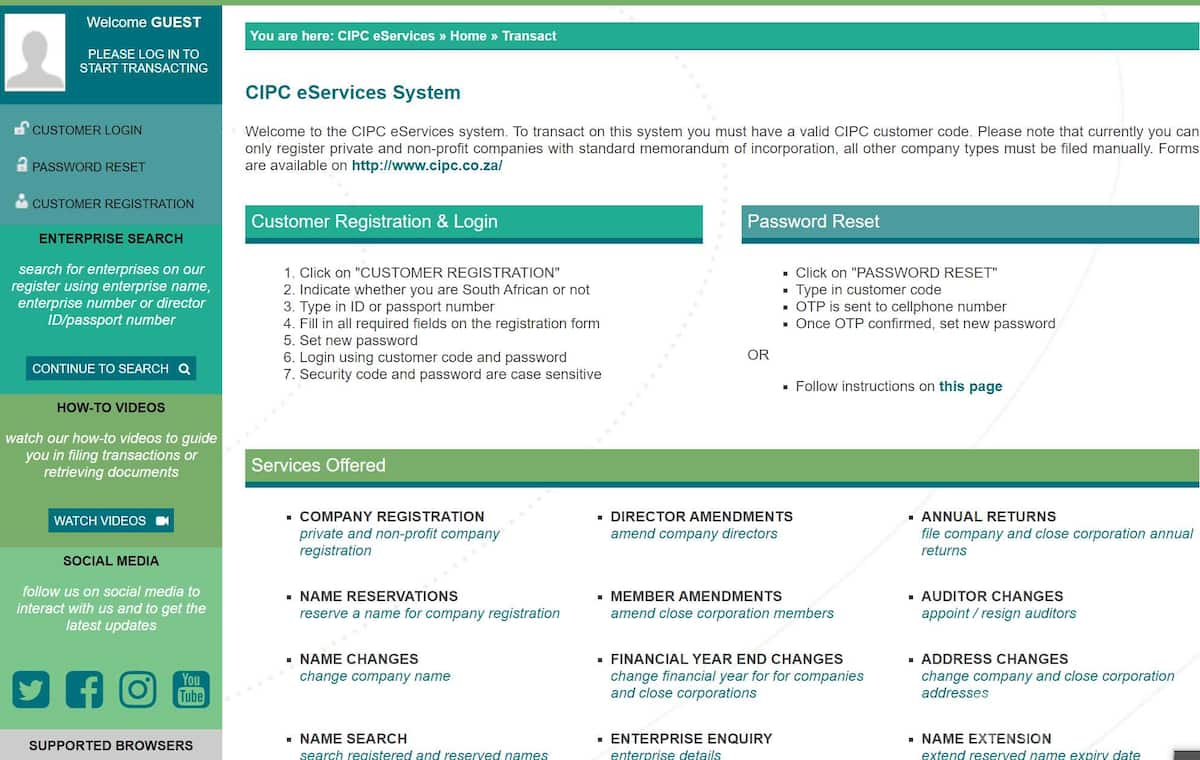Numerous advantages come with having a formally registered business. If you are looking to figure out how to register a company online, the South African government has made it incredibly easy to do so. With the required documents and information in hand, the process does not take long.

Unlike decades ago, when business registration could only be done manually, one can now carry out the entire registration online. What are the steps to register a company in South Africa?
How to register a company online in South Africa
Can I register a company online? Yes, here is everything you need to know about the business registration process in South Africa.
1. Prepare all the necessary documents.
At some point in the process, you will be asked to upload certified copies of the director’s identification documents or passports. Have these documents ready and certified by a commissioner of oaths at any police station.
Have these documents in soft copy on the same device on which you will be making the application. If the company you intend to register will have more than one director, ensure to have copies of all the directors’ ID documents.
2. Visit the CIPC (Companies and Intellectual Property Commission) eService portal

This is the primary portal on which you will register your business online. The portal can be found on the CIPC’s official website. Once you are on the portal, click on the tab labelled ‘customer registration’ on the left-hand side of the site.
3. Indicate your nationality
This step is necessary for company grouping purposes. One of the CIPC’s grouping criteria involves directors’ nationalities. The business registration portal will ask you to indicate whether you are a South African or foreign.
4. Type in the identification information
If you are the sole director in the company, you will only need to input your identification information. If you are registering a company with multiple directors, you will need to input each director’s ID information separately.
5. Create your CIPC login credentials
Once you have typed in the details in the steps above, the system will ask you to create a username and password that you will use to log in to the portal. Once you have typed these, click on the tab labelled ‘customer login’ on the left-hand side of the site.
The system will redirect you to a customer dashboard from where you can access numerous services offered by the CIPC. Click on the icon labelled ‘transaction’ to continue with the registration.
6. Select the ‘company registration’ icon
Once you select the ‘company registration option, you will be redirected to an incredibly feature-packed page. You will be asked to choose between registering your business using eService or Bizportal. While the latter is significantly quicker, it can only be used by South African nationals. This makes eService the better option if one has foreigners on the list of directors.
If you are a tech-savvy South African, you can complete the process on Bizportal without having to upload a single document.
7. Indicate the company type you will be registering.
The system will present you with empty fields to fill in the type of company you are registering. The first step will be a choice between a for-profit and a non-profit company. Most registrations are usually under the former category. Here is a quick look at the various company structures one can register.
- Sole proprietorship: This business structure defines a venture founded and operated by a single proprietor without any partners or co-founders. Many businesses start out as a sole hustle and eventually grow into larger, more complex business structures.
- Partnership: A partnership is a venture founded and operated by one or more partners. It is an ideal business type for leveraging people’s varying skills. For example, a venture can be started by a marketing expert and a product development expert. The two would each focus on their strengths for the development of the business.
- Proprietary Limited company (Pty Ltd): Under this structure, the company is a separate legal entity from the owner. In case things go wrong with the business, the owner’s assets cannot be involved in settlement of debts or other financial damages.
- Public company: A public company trades its shares on a stock exchange. Share trading determines the value of the whole business.
8. Type in the directors’ information

You will be required to input various details regarding the company’s directors. You will notice that for South Africans, the fields will auto-populate once you type in the ID number. This is because the CIPC system is linked with the Department of Home Affairs system.
Here is the information you will require about each director.
- The director’s full name
- Type of director (normal director or non-executive)
- Their country of origin
- Status (active or inactive)
- Date of appointment
- Date of birth
- Contact information (phone and email)
- Physical and postal addresses
9. Indicate the company financials
You will be asked to choose the company’s business year-end. This can be any month of your choice. You will also be required to indicate the number of authorized shares. If you are uncertain, you are advised to start with 10,000.
10. Reserve a company name
Once you are done with the above steps and click continue, you will be redirected to a page that will prompt you to reserve a company name as part of the registration process. Click on the tab labelled ‘choose name.’
You will be required to enter four names (in case your preferred one is unavailable). If the first choice is already taken, the system will automatically go to the second option and then to the third and fourth. Once an available name has been found, your company will be added to the CIPC registration queue immediately.
11. Lodge (incorporate) the company
Once the registration is complete, the last step is called lodging (incorporating). To do this, you will need to upload certified copies of directors’ IDs and memorandum of association to the CIPC. You will then receive a form known as C039, which you will fill out and send to the same email address that sent it.
If you send the email before 10 am on a weekday, you will be emailed the company’s registration documents the same day. If not, they will be sent the following day.
12. Register for an SA tax number

While this is not a step in the registration process, it is essential to do it immediately after the process ends. To apply for a company tax number, contact the SARS (South African Revenue Service) by visiting their official website.
How much does it cost to register a small company in South Africa?
How much does it cost to register a company in South Africa? The CIPC charges a fee of R50 for reserving the name and R125 for the registration of a company. This means that to successfully register a company, one must part with R200.
Have you been trying to figure out how to register a company online on CIPC? This guide has everything you need to know about the process, the fees, and other requirements.
READ ALSO: How to check if a company is registered in South Africa 2022
We recently created a guide on how to check whether a company is registered in South Africa. The business landscape in South Africa is quite wide and dynamic, with thousands of organizations in different economic sectors. Most of the firms operate legally in accordance with the country’s business registration laws. Others, however, are not registered.
There are numerous reasons you may want to do a background check on a company. Some of the most common reasons include conducting business deals, buying shares, or issuing credit. Read on to discover how you can ascertain whether a company is registered or not.
ncG1vNJzZmiaop6yp7jYZ5qoZqqWfHR8kHFwZqCfrHqzscaiqq2domKubq%2FOpqeapqlivK%2B4yKecZqufqsGpecCfqaKbkWO1tbnL